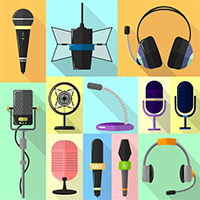Your voice is your livelihood. You spend a great deal of time and effort using it to communicate with the masses. It is vital to your success. But examining the self-care movement reveals that the topic of caring for your voice gets very little attention.
As a physical therapist with an extensive background treating patients who did not respond to other interventions, I learned that the fastest path to healing and optimizing function is in treating nerves.
Nerves control everything and sometimes they get pinched between bones, muscles, ligaments, and more. If you change the nerve input to the body, the pain and mobility immediately changes.
The nerve that I have found yields the most profound effects on the body is the vagus nerve. The vagus nerve is a major parasympathetic pathway that comes out of your brainstem. It is outside of your spinal cord. Ideally the vagus nerve has an optimal tone, or range in which it fires. The gold standard measurement is heart rate variability (HRV).
Everyone has an optimal HRV range based on their age. Someone who is anxious or stressed has a high HRV, exceeding the boundaries of this optimal range.
Trauma sometimes shuts down the vagus nerve to the point where we go into freeze mode.
Someone who is traumatized to the point of freeze or severely depressed may have a flattened HRV, not filling the optimal range.
The feeling of having a high HRV is easily identifiable. When you get stressed and get that lump in your throat, your heart races, your palms sweat, and you get constipated or have diarrhea, that all happens because your vagus nerve is suppressed.
This is the same as being in “fight or flight” mode. It can be induced by stress or trauma. Many people live constantly in an elevated state of fight or flight. In this state our sympathetic nervous system dominates, and the calming parasympathetic pathways don’t always recover to a point of balance.
Due to the size of the vagus nerve and far-reaching effects, removing mechanical trauma to give it more room to move has a seeming “magic wand” effect on a myriad of problems in the body.
I have very specific exercises that I teach to my clients based on my examination findings and their goals. Often where a patient is experiencing symptoms is not where the problem is. Keeping the vagus nerve free to move at all of its major choke points goes a long way toward preventing everything from hoarseness to back pain.
How does vagus nerve compression show up in your body? Here’s some general info and what can you do about it! These exercises do not have any known precautions or contraindications. If you have any questions or concerns, please consult with your healthcare team before proceeding.
Side effects may include calming your pre-show jitters, making you sound smooth on the airwaves, improving your interview skills, prevention of voice disorders, normalized digestion, decreased pain and inflammation, resolution of trauma, healing of heart issues, reduced anxiety, and experiencing more pleasure.
- Voice: Trauma and stress always shows up in the breath and the voice. The vagus nerve innervates muscles of speech and swallowing. One of the exciting developments in my profession has been the use of vocalization exercises for patients with incontinence. These patients are literally causing excess downward pressure causing them to pee on themselves because their voices are all bottled up, mechanically and spiritually. Keep your throat chakra open. Remedy: Chant. You can chant “Om”, vowels, Sanskrit, even curse words. Just chant.
- Breath: Again, trauma always affects the voice and the breath. In the midst of stress and trauma, our diaphragms go from being a nice round dome, to a flattened one. Remedy: Exhale. The major exhalation muscle, the transversus thoracis, sits under the breast bone and is often tight, keeping us breathing shallowly. You can stretch it out by inhaling for a count of five, holding for a count of eight, and exhaling like you are blowing up a balloon for a count of thirteen. The voice exercise will help with this, too.
- Heart: Our vagus nerve innervates our heart, and thus generates the electromagnetic fields of heart, which is what connects us to others. Some interesting research has found that our electromagnetic fields synchronize with the electromagnetic field of the earth, and that when space weather disrupts the earth’s field, it also shows up as a disruption in ours. The severity to which it disrupts appears to be dependent on the strength of our interpersonal connections. This connection is 360-degrees, yet most of us only pay attention to the 180 degrees in front of us. Remedy: Inhale in to the back side of your heart for five repetitions. Bonus: Amplify the benefit by using the 5-8-13 breathing pattern.
- Head: When you have a forward head posture, you are pinching your vagus nerve at the base of your skull. Remedy: First, identify the tragus of your ear. It is the tab that you would use to cover the opening to your ear to dampen sound or otherwise avoid hearing. Gently grab the tragus of each ear between your thumb and index finger, and pull each one sideways, like your head is a piece of taffy and you are unwrapping it. Hold for one minute. Bonus: Do the 5-8-13 breathing while you are holding this stretch to amplify the benefits.
- Pelvis: Most of us sit way too much. Our pelvic floor gets weak because of the convenience of chairs and seated toilets. Many people don’t get in and out of squatting positions often, taking their joints through a full range of motion and keeping the pelvic floor strong and flexible. Remedy: Guided imagery often works well with the pelvic floor. Bring your attention to your lower abdomen. If you are familiar with chakras, you can bring your attention to your second chakra. Imagine breathing in and out of your pelvic floor and gradually extending the breath up to the top of your head to clear a channel between your pelvic floor and the top of your head. Bonus: This activity addresses all five compression points!
Melanie Weller spent over 25 years in the field of physical health as an athletic trainer and Physical Therapist. she is a board-certified Orthopedic Clinical Specialist, a Certified Exercise Expert for Aging Adults, and a Certified Athletic Trainer.Though Melanie spent most of her career in an outpatient orthopedic setting, she also has worked in hospitals, schools, and home health. Melanie's practice and teachings now looks beyond basic bodywork to the imprint of culture, society, ancestry (and more) on our ability to understand and access our greater intelligence.
Melanie Weller – Physical Therapist, Board-Certified Orthopedic Clinical Specialist, Certified Athletic Trainer and Certified Exercise Expert for Aging Adults

Create a Professional and Profitable Audiobook!
The Insiders Guide to Audiobook Production gives you the inside track to create a high-quality and effective audiobook and reach a much larger new audience.
Thank you!
Please check your inbox for your email.
If you don't see anything in a few minutes, please check your spam folder.


